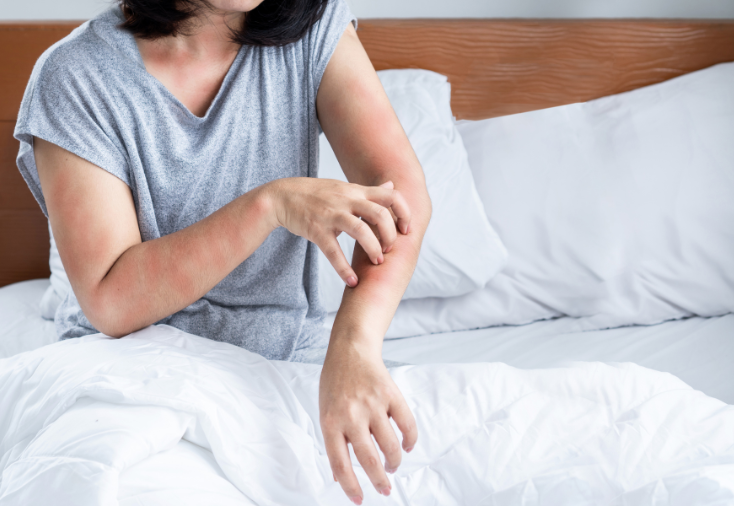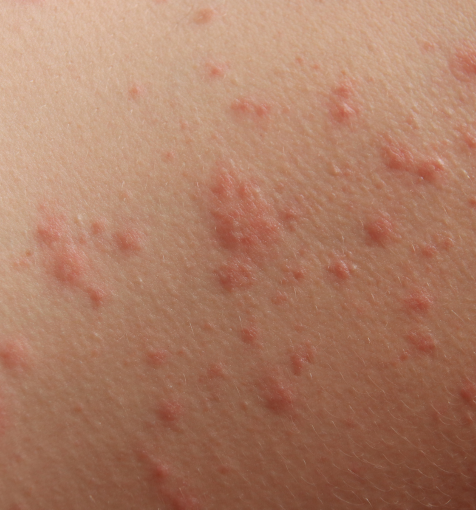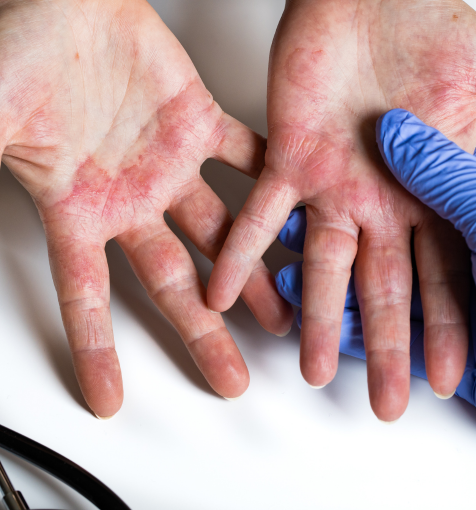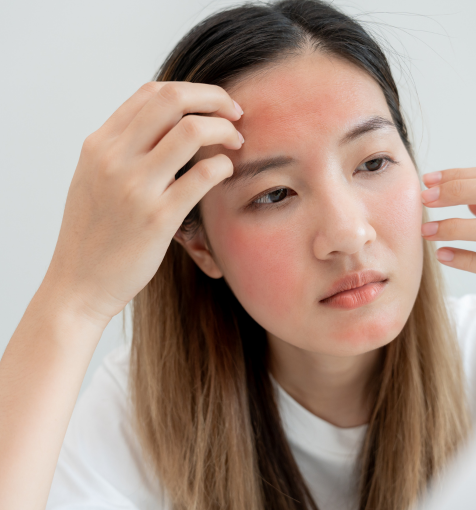Get Relief from Itchy Rashes in New Jersey
Contact dermatitis is a common skin condition that develops when your skin comes into contact with an allergen or irritant. The result is an itchy, uncomfortable rash that can affect people of all ages. At Skin & Laser Center of NJ, we provide personalized care to identify the cause of your reaction and offer effective treatments to ease discomfort and prevent future flare-ups.


Contact dermatitis occurs when the skin reacts to something it touches. This may be due to an irritant, such as soap or cleaning chemicals, or an allergen, such as certain plants, fragrances, or metals. Important details include:
Roughly 20% of the population experiences contact dermatitis
Common triggers include detergents, perfumes, nickel, and poison ivy
Occupational exposure increases risk, especially for healthcare workers, hairdressers, and cleaners
The condition is not contagious but can cause significant discomfort and embarrassment
Symptoms of contact dermatitis vary depending on the severity of the reaction and the type of trigger. Patients may experience:
Itching, redness, and swelling
Dry, scaly, or cracked skin
Burning or stinging sensations
Fluid-filled blisters that may ooze and form crusts
Thickened or leathery skin with prolonged irritation


Our providers use a comprehensive approach to help patients find relief and avoid repeat flare-ups. Treatment may include:
Trigger identification and avoidance: Determining the cause of your rash is the first step to preventing future outbreaks
Topical medications: Corticosteroid creams and ointments to reduce inflammation and itching
Oral medications: Antihistamines or, in severe cases, systemic corticosteroids
Soothing skin care recommendations: Gentle moisturizers and non-irritating cleansers to restore skin health
With the right diagnosis and care, symptoms can typically improve quickly, allowing you to get back to feeling comfortable and confident.
Learn More About Contact Dermatitis
There are two types of contact dermatitis: allergic and irritant. The irritant form is the most common type, developing when something comes into contact with the skin but the patient isn’t allergic to the thing causing the irritation. Common causes of irritant contact dermatitis include diaper dermatitis (urine or feces irritates the skin), dry, cracked hands due to excessive hand wetting (irritation due to moisture), and redness and itching under the breasts (irritated by rubbing and moisture). Soap, shampoo, and food can also be mild irritants.
Anyone can develop contact dermatitis. In fact, the condition is so common that your doctor may tell you that you have occupational contact dermatitis (can be irritant or allergic). People who are more likely to get occupational contact dermatitis include nurses (and other healthcare workers), beauticians, bartenders, chefs (and others who work with food), florists (and others who work with plants), construction workers, janitors, mechanics, and plumbers.
The second and less common type is allergic contact dermatitis. This occurs when you are allergic to a specific chemical that comes into contact with your skin. Over the next three to 10 days, you develop a scaly or blistered, inflamed, itchy rash in the area of contact. Common causes of allergic contact dermatitis include poison ivy, nickel (in cell phones, jewelry, zippers, etc.), makeup, jewelry, latex gloves, nail polish, and fragrances. There are more than 3,600 other possible causes of allergic contact dermatitis, and it can develop from a chemical that you’ve been using for many years. Your provider can narrow down possible causes with a detailed history and thorough examination—and may recommend doing patch allergy testing. This helps to figure out which chemical is causing the rash and helps you select skin products without this chemical.
Patch testing involves the application of a series of allergen-containing panels directly to your back. After two days, your provider will remove the panels and examine the skin to see if there are any allergic reactions. A second examination after another two days helps to ensure an accurate diagnosis and identification of which allergens cause contact dermatitis.
Treatment for allergic and irritant contact dermatitis are the same. In both cases, we will work to help identify the cause of the rash. After identifying the cause, the next step is for the patient to avoid the substance that is causing the rash. It may take one to three weeks to improve after contact with the substance has stopped.
We may prescribe antihistamine pills, topical corticosteroids, topical or oral antibiotics to address any potential infections, oral or injectable biologic medications, and phototherapy to help reduce rashes. Steps you can take at home to help minimize symptoms include moisturizing to help seal the skin and protect it from chemicals. Oatmeal baths can help relieve itching and discomfort. For patients suffering from contact dermatitis caused by poison ivy, poison oak, or poison sumac, rashes may take up to six weeks to clear even with the appropriate treatment.
Convenient walk in hours available below. No appointment needed! Accepting private insurance and medicare. No medicaid plans.
Learn more about medical treatments at New Jersey’s Skin & Laser Center of NJ. Call 201-500-7525 or contact us online to schedule a consultation.